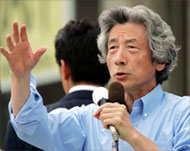Victorious Koizumi in race against time
After defeating the old guard in his Liberal Democratic Party and winning the support of the public in Japan’s general election on Sunday, Prime Minister Junichiro Koizumi could be forgiven for putting his feet up for a week or two.

It is unlikely that he will, however, as he will be more aware than ever that the months and weeks of his administration are steadily running out.
Koizumi has repeatedly stated that he will not seek re-election as party president when his term of office runs out in September next year, so his final 12 months may see even more activity than the year before Sunday’s historic vote.
“He will see this as the democratic mechanism giving him the right to push through with policies that he has already pitched as well as more that he might yet come up with before he leaves office,” Makoto Watanabe, a lecturer in media and communications at Hokkaido University, says.
“All the new politicians that Koizumi has introduced – “the assassins” who were given the task of ousting those that rebelled against his plans – will simply work as robots as most of them have very little experience of politics, which will mean that he will have centralised control,” he said.
Landslide victory
Koizumi’s victory has rightly been described as a landslide, giving him 296 seats in the 480-seat House of Representatives, the second largest majority the party has enjoyed since its foundation 50 years ago.
New Komeito, the LDP’s coalition ally, lost three seats to finish with 31, but the biggest loser was the Democratic Party of Japan, whose leader, Katsuya Okada, resigned after his party won just 113 seats, down from 177 in the previous parliament.
“It will be very easy for Koizumi to handle everything for the next 12 months,” Watanabe said, adding, “I think he will be a very happy man.”
 |
|
Koizumi may feel he has public |
Even before election day, rumours had begun circulating in Nagatacho – Tokyo‘s political heartland – that not content with forcing through his postal privatisation plans after 11 September, Koizumi might be planning a spectacular sacrifice on his way out of office.
Raising the consumption tax would inevitably be an unpopular move, but with a huge national debt it is something that the Japanese government has considered.
The suggestion is that Koizumi may grasp that particular nettle in order to spare his successor the wrath of the electorate.
“There was a slip of the tongue by one of the senior cabinet members during the election during which he suggested that the consumption tax might be raised,” said Pema Gyalpo, a professor at Yokohama University, who added that victory will pave the way for several other of Koizumi’s pet projects.
“The ruling party wants to change the constitution so we may well see a formal committee set up to examine that, while I also believe that Koizumi will feel he has the support of the majority to pay his respects at Yasukuni shrine again,” he said.
People’s support
“Mr Koizumi undoubtedly has the support of many of the people and will push his policies through, but I have noticed that he is mentioning many issues in passing in his speeches to the voters,” Gyalpo said.
“I think he will see his election as endorsement for all these policies.
|
“I think he will see his election as endorsement for all these policies” Pema Gyalpo, |
“Sometimes he reminds me of Napoleon in George Orwell’s Animal Farm,” he added. “In the book, there were a series of rules, such as ‘an animal will not kill another animal,’ but slowly the words change. Koizumi is changing his policies in that way.”
And the final weeks of his tenure will be overshadowed by the search for his successor, Gyalpo says, with three or four potential replacements already beginning to jockey for position.
Koizumi positioned the election virtually as a referendum on his reform proposals, particularly the plan to privatise the post office.
And while the opposition and old guard were unhappy that more issues were not highlighted during the campaign, the public have responded to the persuasiveness of the prime minister.
“I only started voting about four years ago because prior to that I didn’t feel my vote would ever change anything,” said Shin Goto, a 41-year-old entrepreneur.
“Now, I get the real feeling that effective change is happening. I voted for Koizumi four years ago and I did the same today.”
Purging problems
Goto voted in the Kanagawa number 25 district, which covers a relatively affluent area to the south of Yokohama. The vast majority of election campaign posters in the windows of homes and shops showed the Liberal Democratic Party incumbent, Jun Matsumoto, shaking the hand of Koizumi.
“I believe that privatisation of the postal system will increase competition and make it more effective, and once that happens standards will rise,” Goto said.
“I think that at last Japan is on the verge of purging all the problems it has had, both economic and political, and now would be a very bad time to change the leader.”
|
“I think that at last Japan is on the verge of purging all the problems it has had, both economic and political, and now would be a very bad time to change the leader” Shin Goto, |
Masaaki Shigeno, a 62-year-old businessman, believes that Koizumi is, “the best person for Japan at the moment”.
“Postal reform is very important and I think if you look back at the privatisation of Japan Railways and Nippon Telegraph and Telephone Corp in the 1980s, then you can see they have been a big success,” he said.
“Since privatisation, they are making big profits and offering improved services for customers,” Shigeno said.
“I’m also very much in favour of efforts to achieve small government and do away with a lot of the bureaucracy.”
Troops in Iraq
Mariko Shigeno, a 35-year-old restaurant operator, said: “I’m in favour of postal reform because we need to improve its functions to make sure it continues to operate in the future, but there are some LDP policies that I oppose, including the sending of the Self-Defence Forces to Iraq.“
 |
|
The Iraq deployment issue was |
She added: “In fact, I would not normally vote for the LDP, but this time I really think Japan has to make these changes.
“When the next election comes around, maybe I won’t vote the same way, but the choices this time are too important for the country.”
And while Koizumi will undoubtedly be delighted with the outcome of the election, he has apparently achieved a great deal more than just that.
“The extraordinary thing about this election is that he is killing three birds with one stone,” Stefan Worrall, an economist with Credit Suisse First Boston in Tokyo, said.
“He really has flushed the old guard out, shown up their vested interests and left them to live or die by their positions, while also bringing about postal reform and showing very clearly to the public that reform can be achieved and that future reforms will not come up against this kind of resistance.”